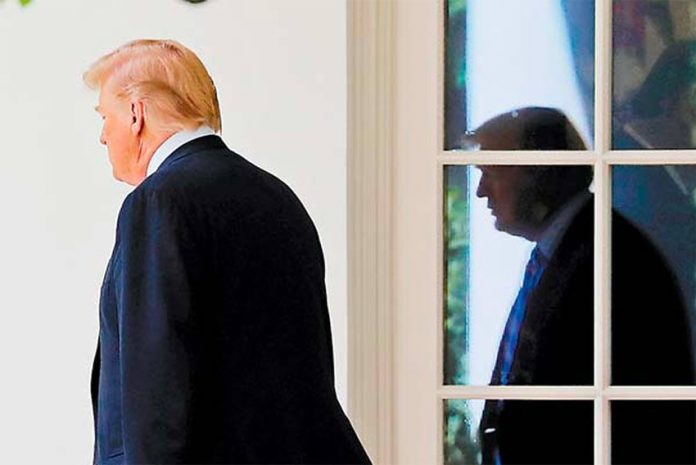United States President Donald Trump has suggested that the North American Free Trade Agreement (NAFTA) could be replaced with two separate trade accords, one with Mexico and another with Canada.
“To be honest with you, I wouldn’t mind seeing NAFTA where you go by a different name, where you make a separate deal with Canada and a separate deal with Mexico. Because you’re talking about a very different two countries,” Trump told reporters at the White House yesterday.
The U.S. president also reiterated his opinion that the trilateral trade pact has been “a lousy deal” for the United States since its introduction in 1994.
“We lose a lot of money with Canada and we lose a fortune with Mexico and it’s not going to happen like that anymore,” he said.
“Mexico has taken our car companies, a big percentage of them, and we can’t do that. . . I want fair trade, I like free trade, but I want fair trade, at a minimum I want fair trade,” Trump added.
Asked by a reporter about what he says to close United States allies who have complained about the introduction of the new metal tariffs, the U.S. president returned to his often-repeated view that the United States has been the victim of unfair trade deals.
“They’re our allies but they take advantage of us economically . . . I love Canada, I love Mexico, I love them. But Mexico’s making over [US] $100 billion a year and they’re not helping us with our border because they have strong laws and we have horrible laws,” he said, overstating the size of the deficit by around US $30 billion.
“They could solve our border problem if they wanted but they don’t want to and when they want to, then I’ll be happy. But I think we have a good chance of doing some great trade deals that will make America great again, right?”
Mexican President Enrique Peña Nieto and Canadian Prime Minister Justin Trudeau renewed their commitment to reaching a NAFTA deal this week, although they also condemned the move to impose duties of 25% on steel and 10% on aluminum.
In response, both countries announced reciprocal tariffs on a range of United States imports.
The products selected by Mexico — including steel flats, pork legs and shoulders and a range of fruits and cheeses — were chosen specifically to affect exporters in states that are politically important to Trump.
The Mexican Council on Foreign Relations (Comexi) said that targeting could have domestic ramifications for Trump that may cause him to reconsider the introduction of the metal tariffs.
“We could see a political mobilization from President Trump’s electoral base to warn him that the effects could be very damaging and that they could even cost him at the [midterm] elections in November,” the organization said in a statement.
The tariff tit-for-tat has further complicated a difficult and drawn-out NAFTA renegotiation process that has failed to reach resolution despite repeated claims from leaders and trade officials that progress is being made and a deal is not far off.
Trump’s latest remarks will create even more uncertainty about the future of the 24-year-old pact.
Earlier yesterday, the U.S. president also took aim at the United States’ northern neighbor on Twitter.
“Canada has treated our Agricultural business and Farmers very poorly for a very long period of time. Highly restrictive on Trade! They must open their markets and take down their trade barriers! They report a really high surplus on trade with us. Do Timber & Lumber in U.S.?” he wrote.
Trudeau has been highly critical of the introduction of the new tariffs this week, describing them as “totally unacceptable” and challenging the grounds on which they were imposed.
“The idea that we are somehow a national security threat to the United States is quite frankly insulting and unacceptable,” he said yesterday.
Mexico said Thursday that the basis on which the tariffs were imposed is “not appropriate or justified.”
Juan Pablo Castañón, president of Mexico’s Business Coordinating Council, said yesterday that the tariff dispute has placed NAFTA negotiations “in serious difficulties” but added that it still may be possible to reach an updated deal before the U.S. midterm elections.
Comexi agreed that the tariff announcement this week didn’t help the renegotiation process, describing the atmosphere it created as “not the best” for constructive dialogue.
Source: Milenio (sp)
